Innsbruck was overshadowed by the return of Janja Garnbret. Would she win after a year off since her last Boulder World Cup and over 300 days since she last competed in Lead? Or would the youngsters be able to beat her?
The competition delivered a surprise, though: the return of Toby Roberts. Toby was 51st in Bern just the week before and hadn't reached a final all season.

The win was Toby's first Boulder medal since Prague 2024 and only his second win, and it had a 2024 Paris Olympic feel about it.
Toby's flash of the powerful fourth boulder and a quick top on the 3rd slab meant he was ahead of Sorato Anraku on attempts after he finished his round. Sorato had to top the final boulder to win the gold medal. On his first attempt, he got to the last move, but missed the match beta on the small crimp. Instead, he launched himself towards the final sloper, sliding off and flying towards the camera crew metres away. His foot slipped on his second attempt, and on his third, he fell trying to match the crimp. He sat on the mats, defeated, as the clock counted down again. Just like in Paris, he had a chance to beat Toby, but didn't seize it.
And with that, Toby Roberts won his second gold medal. He is the 1st British man to win multiple Boulder gold medals. Andrew Earl, Malcolm Smith, and Mark Croxall have all won a single Boulder World Cup.
Roberts said after the final,
“This season has been quite hard, but going into this event I wanted to give everything, and to be honest I’m a little bit starstruck. I’m just so happy.
“I definitely struggled a bit post-Olympics, and when I started the season it hit me and I started to feel quite bad. I just wanted to go out there and climb the way I know I can. This competition has been incredible, I enjoyed every moment and to get away with a gold medal doesn’t even feel real.
“I’m pretty happy with the rest day, my skin is pretty thin, but I’m on an absolute high right now and I’m going to ride that through, it’s what I needed to gain a little bit of confidence.”

Despite not topping the 4th boulder, Sorato lost to Toby on the slab. It took Sorato four attempts to top the slab, while Toby flashed it. However, Sorato only had six and a half minutes of rest before the slab boulder instead of the 20 minutes he would have had.
He had so little rest because his flash of the second boulder was appealed successfully for an incorrect start – neither of his feet were touching the start hold in a stable position. The appeal was submitted immediately, but it took over 20 minutes for the officials to process the appeal and make a decision. Instead of coming out to climb the third slab boulder, Sorato was asked to re-climb M2, which he did on his first attempt.
The officials decided to let Sorato have one boulder rotation of rest between climbing M2 again and attempting M3, which was 6.5 minutes including transfer times. We will never know if Sorato had more rest whether he would have completed the climb with fewer attempts.
There is no mandated rest period for boulder rounds after an appeal or technical incident, even for qualification or semi-final rounds. The amount of time to allow athletes to rest is left up to the event officials to maintain fairness while also balancing the needs of the broadcasters, audience, and other athletes.
There is no mandated rest period for boulder rounds after an appeal or technical incident.
This is different to Lead, where there is a historic rule which mandates 1 minute of rest per scoring hold up to a maximum of 20 minutes. We saw this rule used in Wujiang this year when Neo Suzuki was caught by the belayer after he slipped and had to re-climb the route. The rule hails from a time when technical incidents, like holds spinning, were more common many years ago.
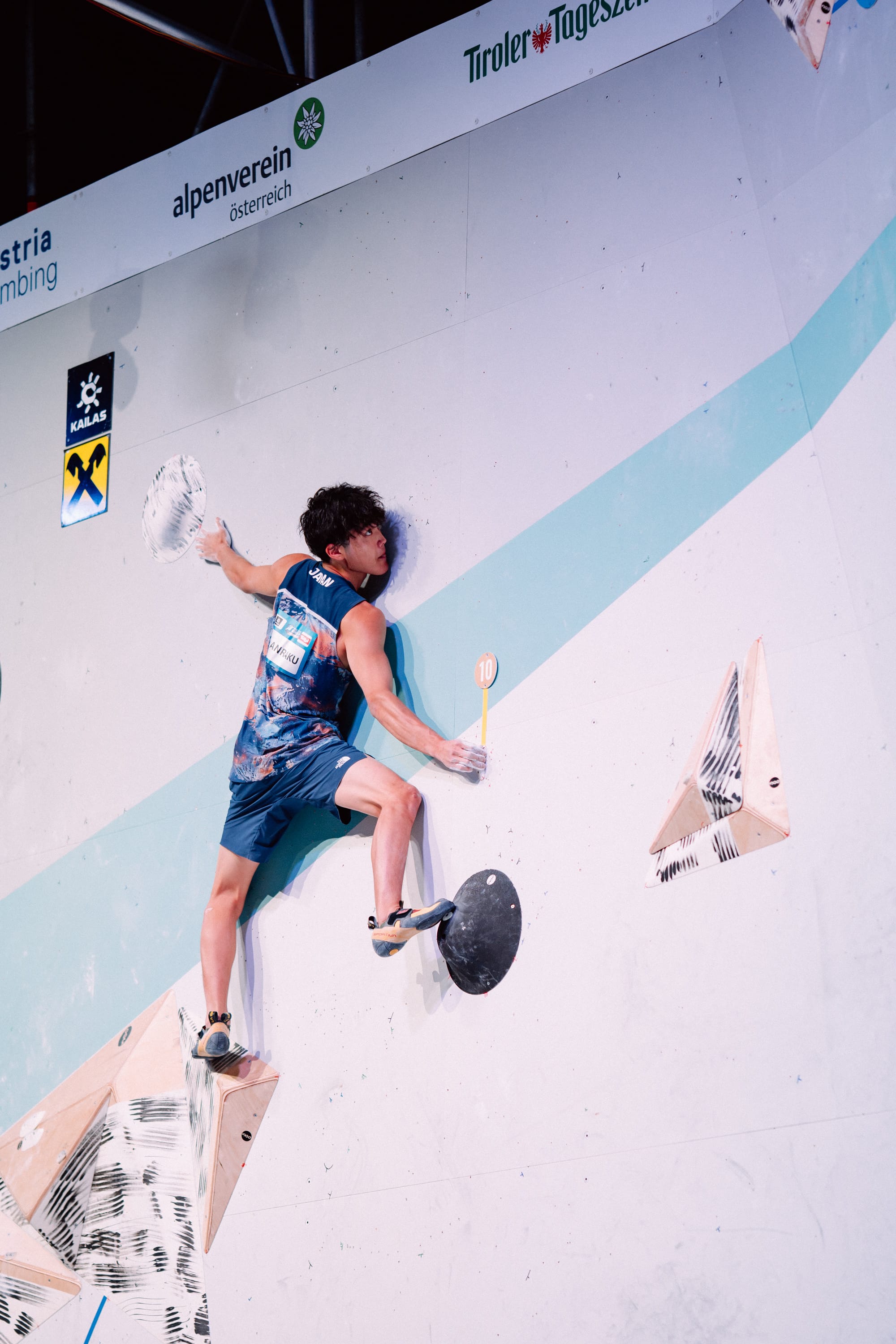
The third spot on the podium was taken by an ecstatic Hannes Van Duysen, who won his 3rd Boulder World Cup medal in Innsbruck. His quick zones on the 1st, 2nd and 4th boulders gave him the 0.1 point edge over Max Milne. Had we used the old rules (which reward attempts to top more), then Max would have finished third. Max topped the slab in three attempts compared to Hannes's five.
Results
- Toby Roberts – 69.8 points
- Sorato Anraku – 69.6 points
- Hannes Van Duysen – 54.6 points
- Max Milne – 54.5 points
- Dohyun Lee – 44.9 points
- Mejdi Schalck – 44.3 points
- Sohta Amagasa – 39.9 points
- Nicolai Uznik – 19.3 points
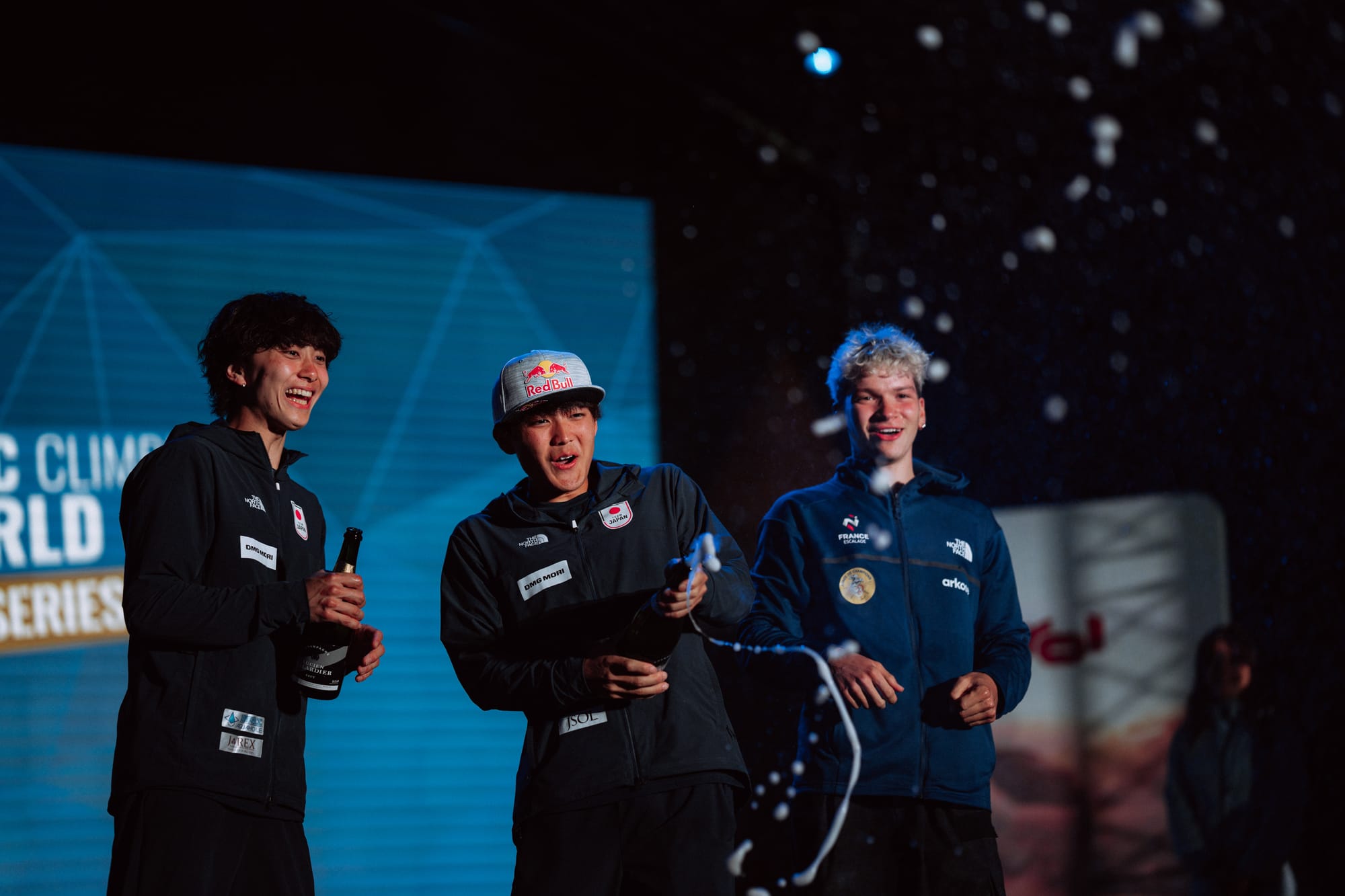
Sorato had won the Boulder World Cup Series going into Innsbruck using the best of 5 scores, which allows athletes to drop their worst result. Instead, they used all 6 events to determine the ranking. The IFSC wrote:
An important change to the IFSC World Cup Rankings format took effect in 2025: unlike previous seasons, where the lowest score was dropped for athletes competing in more than five events, this year all results counted toward the final total. The rule shift rewarded season-long consistency and played a key role in shaping the final standings
This did not change the top 2 in the series, with Sorato winning his 3rd Boulder World Cup series, his third in a row. He joins Jérôme Meyer and Kilian Fischhuber as the only men to have won three World Cup series in a row. No man has ever won four World Cup series in a row.
Mejdi Schalck finished 2nd after reaching every final and winning 1 gold and 2 silver medals this year. The last Frenchman to finish on the podium of the Boulder World Cup series was Guillaume Glairon Mondet, who finished 3rd in 2014. Jérôme Meyer is the only Frenchman to have won the Boulder World Cup series.
The rule change did change who was third in the series. Using the old rules, Dohyun Lee would have finished 3rd. But after including all 6, Sohta Amagasa moves ahead of Lee due to competing in all 6 World Cups while Lee skipped Curitiba.
2025 Men's Boulder World Cup Series Top 10
| Rank | Name | Country | Score |
|---|---|---|---|
| 1 | Sorato Anraku | Japan | 5300 |
| 2 | Mejdi Schalck | France | 4145 |
| 3 | Sohta Amagasa | Japan | 3240 |
| 4 | Dohyun Lee | South Korea | 3105 |
| 5 | Hannes Van Duysen | Belgium | 2355 |
| 6 | Paul Jenft | France | 1965 |
| 7 | Tomoa Narasaki | Japan | 1941 |
| 8 | Anze Peharc | Slovenia | 1925 |
| 9 | Meichi Narasaki | Japan | 1875 |
| 10 | Yufei Pan | China | 1764 |
Janja Garnbret brushes off the cobwebs to take her 18th win
Janja Garnbret looked and felt “rusty” on the wall by her own admittance.
In the qualification round, she failed to top the first slab boulder, which got the most tops of the round. She then took four attempts to top the second slab-like boulder. By the third boulder, she was closer to her usual self, topping them all. She was one of four athletes to top the hard fourth boulder in her group, including Annie Sanders, Erin McNeice, and Anon Matsufuji.
The semi-final was better, but like nearly everyone else in the round, she couldn't get started on the tricky second boulder. Only Annie Sanders topped that boulder and seven other athletes got the zone, with some of them in nine attempts. She also only got the zone on the co-ordination boulder, which no one topped. Erin McNeice did get close on the boulder.
In the final, Janja had found her stride again. She struggled a bit on the first coordination boulder to work out the first sequence, but topped it on her fourth attempt. The second hand jam boulder also took her a bit of work, but her training session with the Wide Boyz clearly paid off. She topped it on her third attempt after getting through the crack section.
Janja said about the hand jam.
The hand jam was actually really cool. I've never done it in a competition before. The routesetters were trying it before, but you could fake it, but this time you really couldn't. I did have one session of hand jamming before, so I had some knowledge in my head about what I should do. I'm honestly happy that I found the solution and I could top the boulder because after the jam it was really cool.”
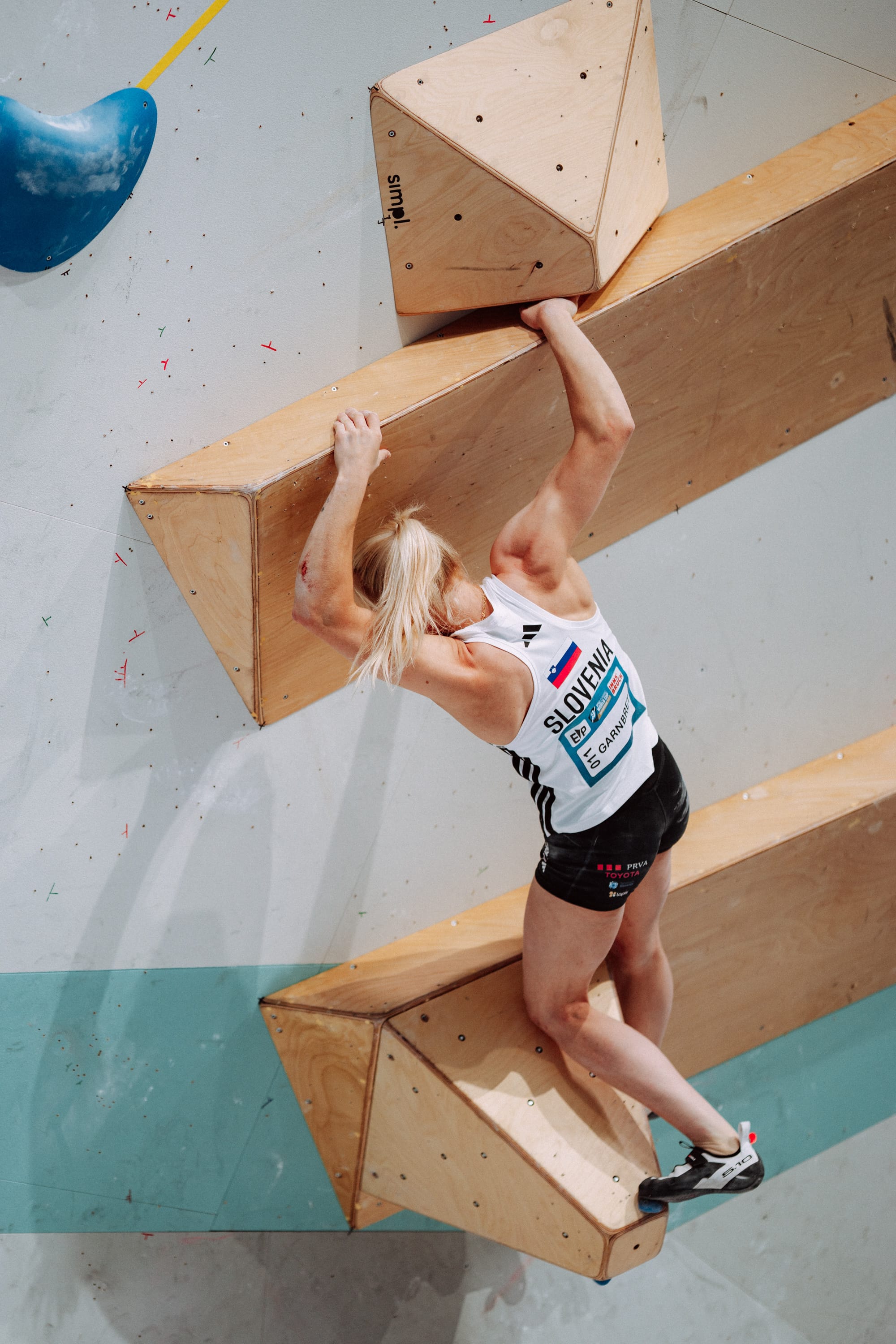
The 3rd slab boulder was an easy one, which she flashed. The final boulder was the power boulder, which she also flashed. She was the only athlete to top the final boulder. Her winning margin of 29.5 points was the largest winning margin by any man or woman this season.
Janja said after the final.
“It feels amazing. I didn’t know how I would feel coming back, but this amazing Innsbruck crowd welcomed me back. I really enjoyed myself on the wall, had a bit of a shaky start in qualification, then it felt 100% better in semi-final, and now I felt like my old self in final. I really enjoyed being back.
“You never forget how to compete, but being back after nine months, in the middle of the season, was not the easiest thing. I had a lot of doubts: ‘Am I ready? Am I not? Am I even motivated?’ But I’m so glad I came back, I enjoyed it so much.
“I’ve been training and I’ve been rock climbing a lot, it was something for my heart, for my soul. I spent a lot of time outside, I trained in the gym as well, but mostly I was taking time off and enjoying other things besides competition and training.”
The win was Janja's 18th Boulder World Cup gold, overtaking Sandrine Levet. She is now third behind Akiyo Noguchi (21 golds) and Anna Stöhr (22 golds) in the all-time record of Boulder World Cup golds.
Oriane Bertone won her 9th silver medal in Innsbruck, and she looked comfortable on the wall again. She climbed the coordination boulder and the slab on her second attempts. She got the zones on both of the power boulders, but looked to be powering out on the top sections of both.
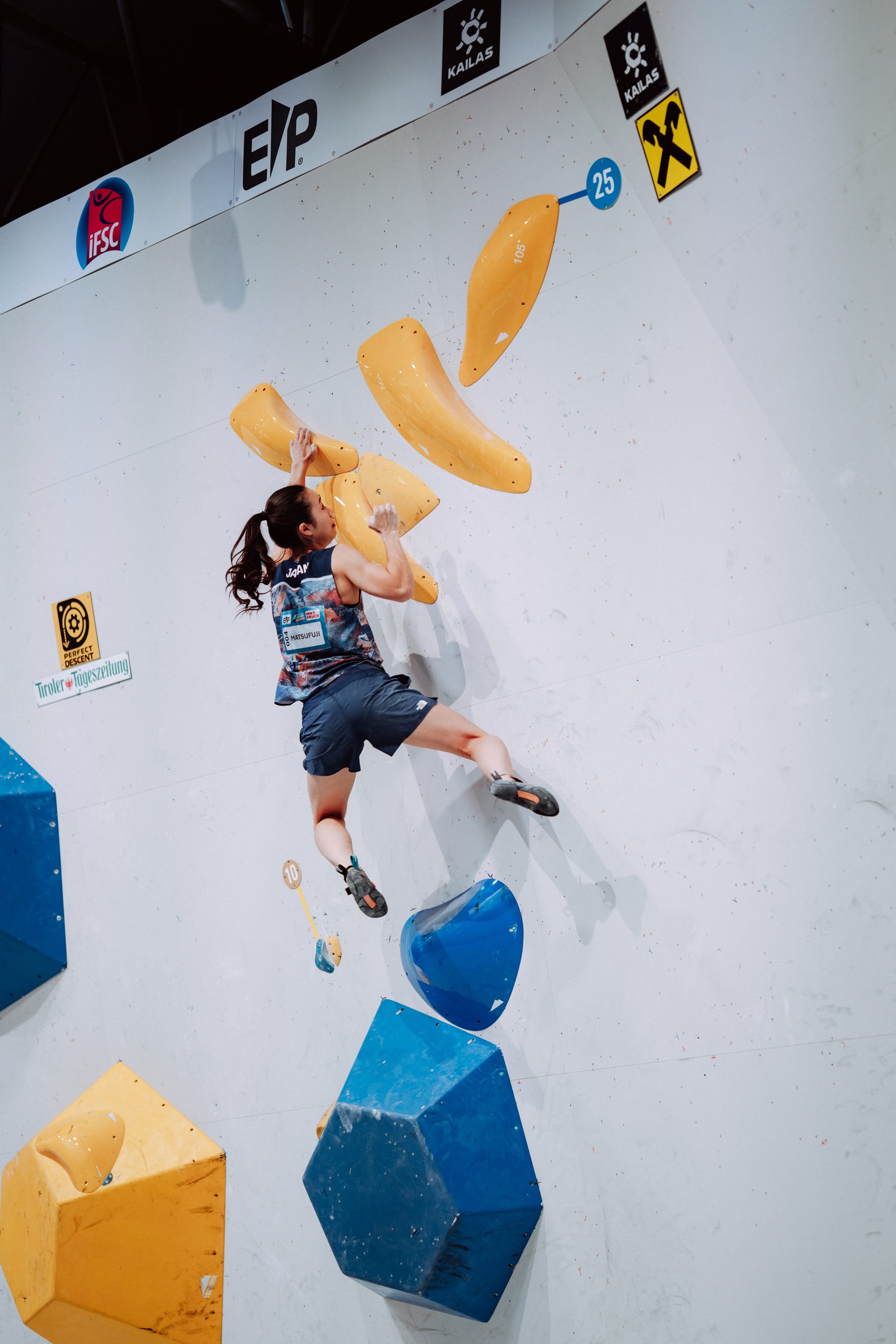
Anon Matsufuji won her second World Cup medal in Innsbruck. She had won her first back in Hachioji in 2023. Matsufuji was the strongest across the first two boulders, topping both, including an impressive flash of the crack boulder. She was ahead of Garnbret on attempts going into the final two boulders.
However, she became flustered on the slab and wasn't able to get to the zone. On the final power boulder, she managed to get to the first pinch above the zone hold, but couldn't make any further progress. Anon finished the round looking despondent for what could have been. The sadness turned to joy when it was confirmed she had won a medal
Results
- Janja Garnbret – 99.3 points
- Oriane Bertone – 69.8 points
- Anon Matsufuji – 59.5 points
- Camilla Moroni – 53.8 points
- Mao Nakamura – 53.6 points
- Annie Sanders – 44.6 points
- Melody Sekikawa – 29.3 points
- Giorgia Tesio – 10 points
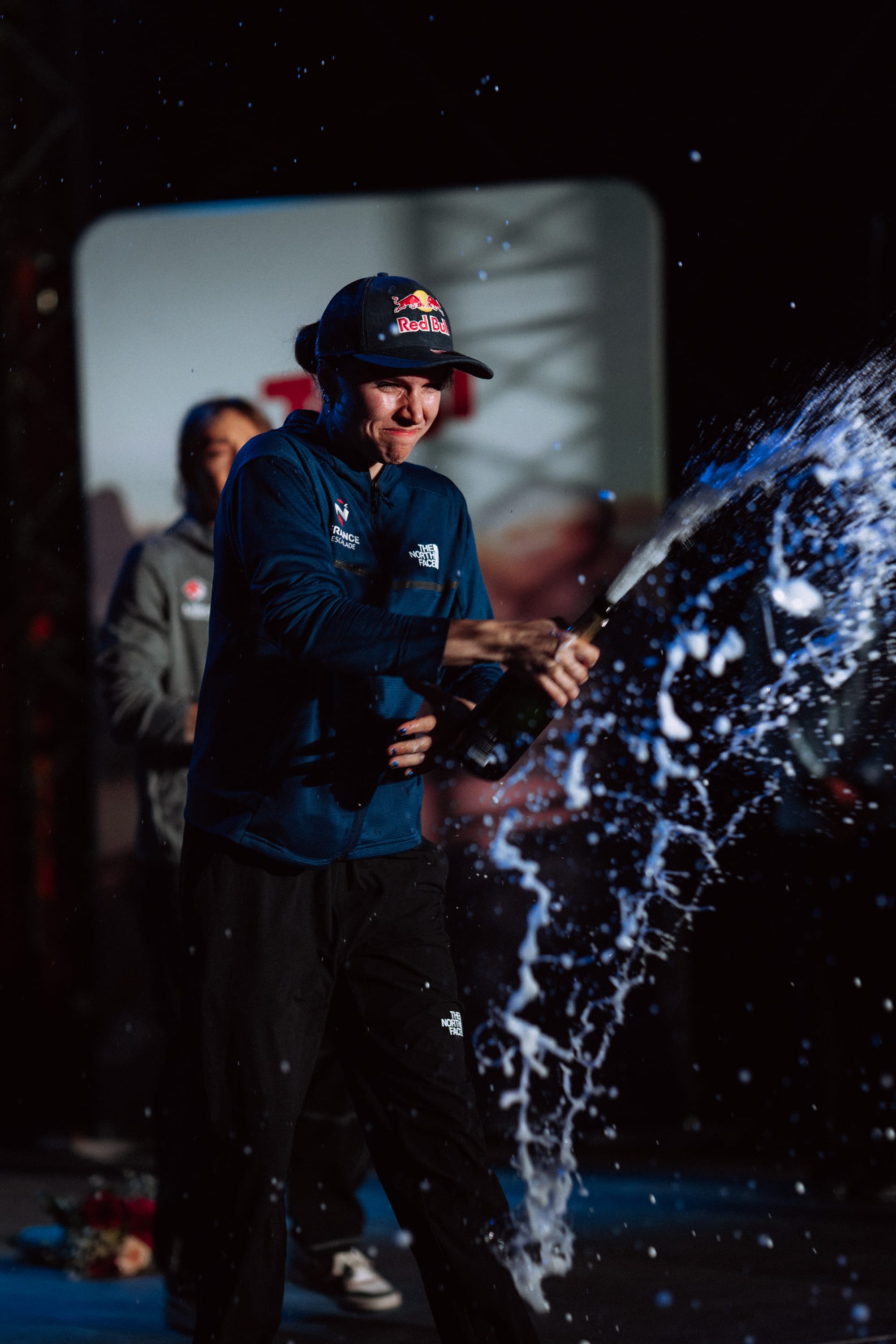
Oriane's second place secured her the win in the Boulder World Cup series. She is the first french woman to win the series since Juliette Danion in 2007, 18 years ago. Oriane's previous highest place was 3rd in 2021 in her first year on the senior circuit behind Natalia Grossman and Janja Garnbret.
Mao Nakamura finished 2nd in the series, improving on her 3rd place finish last year. Annie Sanders finished 3rd. She is the 4th American woman to finish on the podium of the overall after Alex Puccio, Natalia Grossman and Brooke Raboutou.
2025 Women's Boulder World Cup Series Top 10
| Rank | Name | Country | Score |
|---|---|---|---|
| 1 | Oriane Bertone | France | 4375 |
| 2 | Mao Nakamura | Japan | 3480 |
| 3 | Annie Sanders | United States | 3290 |
| 4 | Melody Sekikawa | Japan | 2880 |
| 5 | Anon Matsufuji | Japan | 2670.83 |
| 6 | Erin Mcneice | United Kingdom | 2512.5 |
| 7 | Miho Nonaka | Japan | 2370 |
| 8 | Camilla Moroni | Italy | 2213 |
| 9 | Agathe Calliet | France | 2116.25 |
| 10 | Zélia Avezou | France | 2035 |





